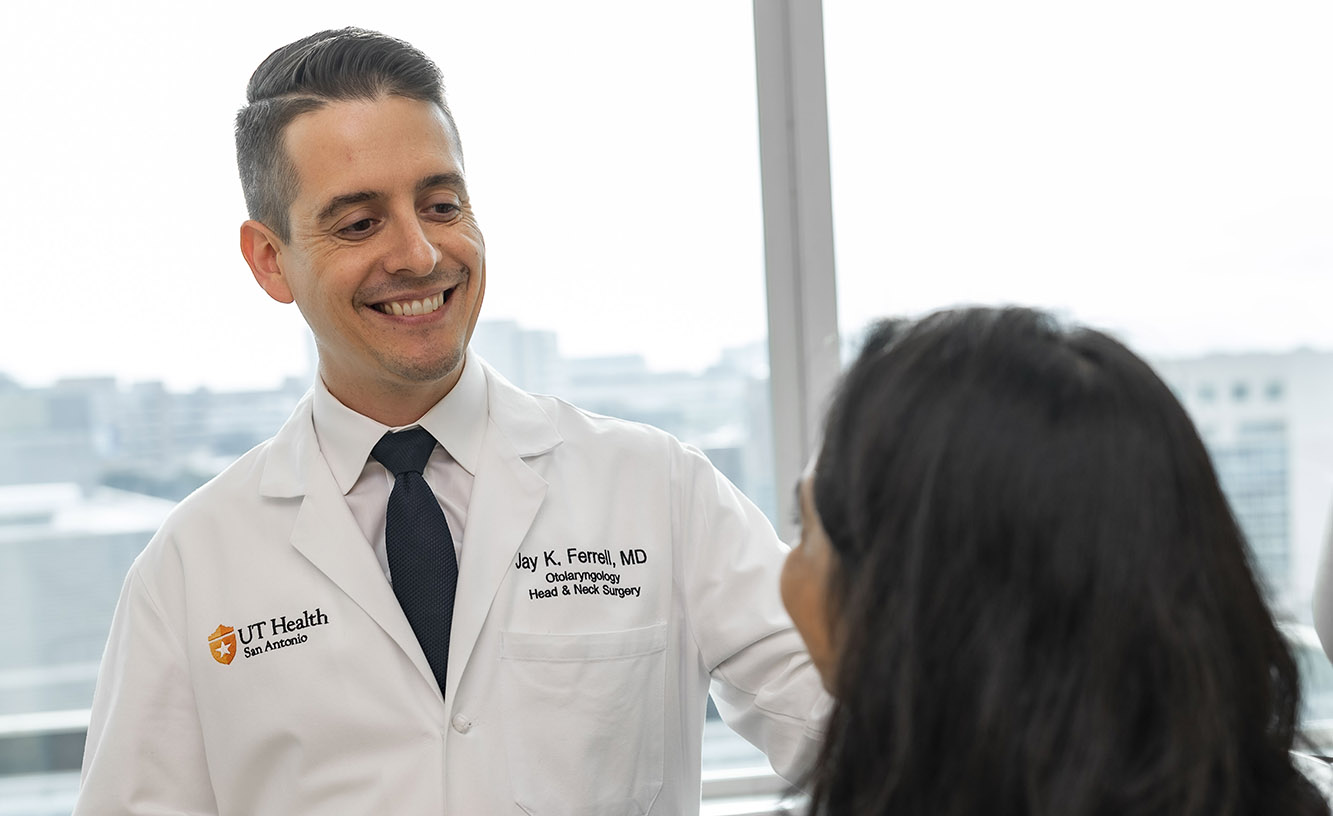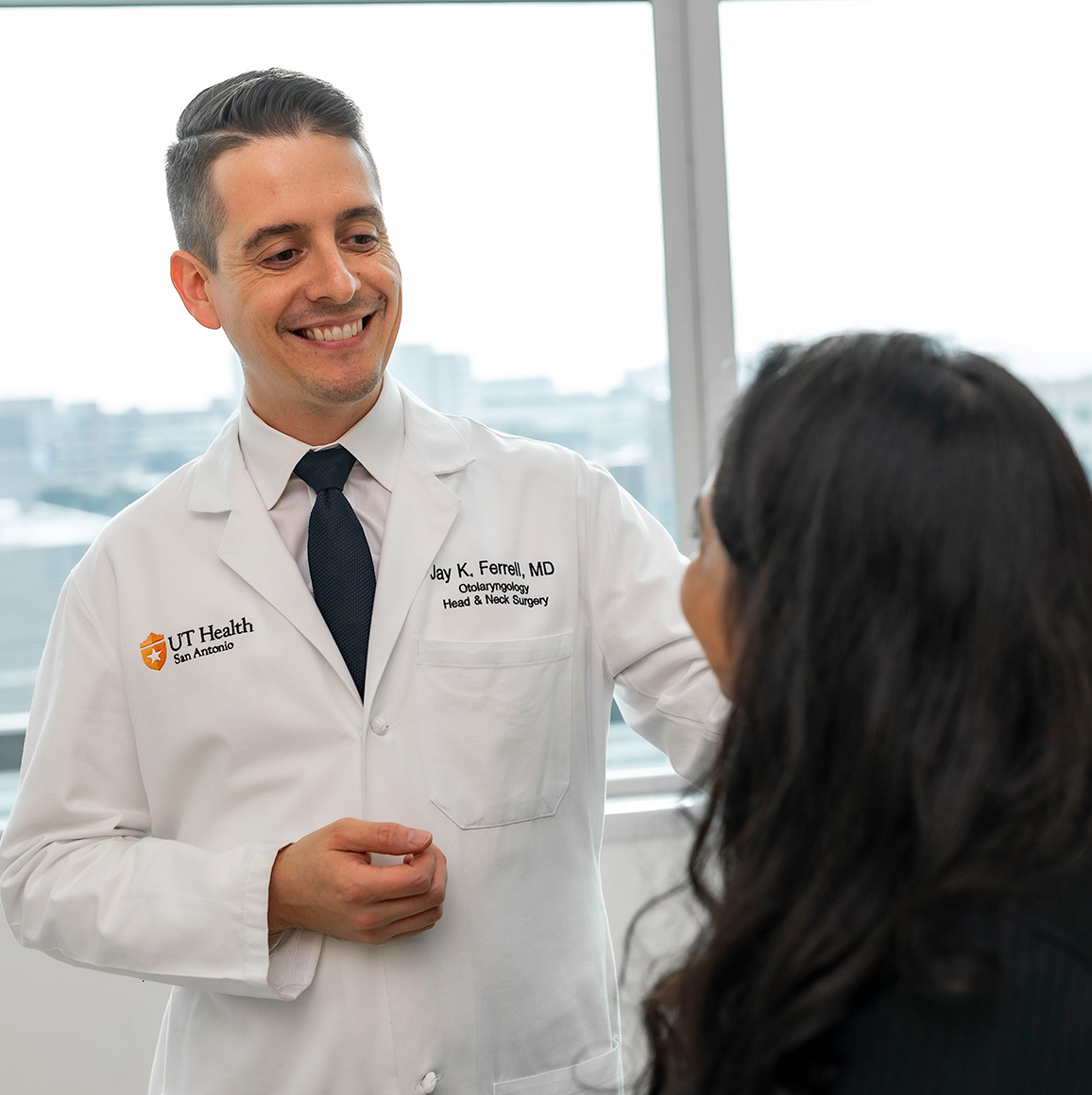

Oropharynx Cancer
Specialists at Mays Cancer Center, home to UT Health San Antonio MD Anderson Cancer Center, work together to provide personalized care. A nurse navigator will help coordinate the entire process, from imaging and diagnostics to treatment.
The oropharynx is the part of the throat that begins at the back of your mouth. Oropharynx cancer can affect many important functions, including speaking and swallowing.
Statistic show that more oropharyngeal cancers are being diagnosed each year. In fact, HPV-associated throat cancer is now the most common HPV-associated cancer in the United States.
You should prepared to talk with your doctor about:
- Your diagnosis – Consider asking questions about how advanced the cancer is, where the cancer is located and next steps for testing or treatment.
- Necessary testing – You may want to discuss what types of testing will be needed to pinpoint your diagnosis.
- Treatment options – Ask what treatments will be appropriate based on your circumstances, including whether you may benefit from radiation therapy robotic surgery. Mays Cancer Center offers minimally invasive surgical methods such as transoral robotic surgery, which requires no incision.
- Support services – Ask about the support available to you, including help you may need with speech and swallowing challenges.
We work together with you to be sure you have an active role in your care and treatment plan. Ask us questions when details are unclear and let us know about your or your loved one’s preferences. We will work as a team to determine the best treatment plan for you.
There are multiple risk factors for oropharynx cancer, including:
- Human papillomavirus (HPV) – HPV, a viral infection that is most often transmitted sexually, is the main cause of oropharynx cancers. The HPV vaccine can help pre-teens, teenagers and adults prevent HPV.
- Alcohol – Drinking alcohol excessively also increases your risk.
- Tobacco – Smoking cigarettes or cigars or chewing tobacco increases your risk of developing oropharynx cancer. Find out more about tobacco use and cancer.
- Medical history – A previous head and neck cancer diagnosis or radiation therapy to your head and neck put you at an increased risk for oropharynx cancer.
Frequently asked questions about oropharynx cancer
A: Oropharynx cancer can affect the
- Base of the tongue, the back portion of the tongue that connects to the throat
- Soft palate, a section of tissue in the back of the mouth that protects your airway from food and liquids when you swallow
- Tonsils, areas of tissue at the sides of the throat that are part of the immune system
A: Testing lets us pinpoint the cancer location and determine appropriate therapies. Your care may include:
- Physical exam to check for abnormal masses near the surface of your neck
- Biopsy, a sample of suspicious tissue we take during an endoscopy
- Endoscopy, a procedure to examine structures in the oropharynx using a special tube with a light and camera at the tip
- Imaging studies, such as computed tomography (CT) or magnetic resonance imaging (MRI), to pinpoint the cancer location
A doctor specializing in diagnosing medical problems (pathologist) examines the biopsy sample under a microscope. Our pathologists detect rare and complex head and neck cancers, providing results you can trust.
Our team of head and neck cancer experts meets regularly in meetings called tumor boards. We review test findings and tailor therapies to your unique needs.
A: Several treatments may be used, depending on the type and stage of your oropharynx cancer. Your treatment plan may include:
- Chemotherapy, a drug used to destroy, control or shrink cancer cells, usually intravenously (through an IV) or by other methods
- Radiation therapy, a focused beam of energy to target cancer cells directly
- Surgery
- Neck dissection to remove lymph nodes and minimize bleeding during surgery
- Transoral Robotic Surgery (TORS), a minimally invasive treatment option
Q: What kinds of support do I have access to during recovery?
A: In addition to cancer treatments, you may need additional supportive services to help you during your treatment journey. These services include:
- Speech and swallow therapy: Our experienced therapists help you cope with speaking or swallowing difficulties.
- Nutrition therapy: Dietitians can recommend a special diet or other methods for getting necessary nutrition if eating becomes challenging.

 Close
Close